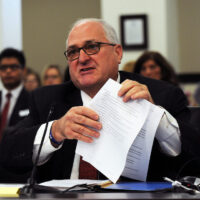Citing what it calls “Kentucky’s rapidly declining standard of education,” a student group is suing the state for failing to provide “an adequate and equitable public education.”

Lawyers for the Kentucky Student Voice Team filed a 70-page complaint in Franklin Circuit Court Tuesday afternoon.
The students allege the state and General Assembly “have failed to maintain the level of commitment to education required” by Kentucky’s Constitution and past court decisions and “failed to meet their obligation to monitor the efficiency of the education system.”
The lawsuit also claims the Kentucky Board of Education and Department of Education “have failed to ensure the state’s educational system is constitutionally compliant.” Judge Phillip Shepherd has been assigned the case.
“Student academic achievement, civic preparation, college and career readiness, and student physical and mental wellness have all declined substantially in recent years,” the complaint says. “The Commonwealth of Kentucky, which was the national model for effective education reform in the 1990s, has now fallen behind in educational practices and accomplishments.”
Named as defendants are Senate President Robert Stivers, House Speaker David Osborne and Education Commissioner Robbie Fletcher.
With about 100 members from across the state, the nonprofit Kentucky Student Voice Team (KSVT) is a spinoff of the Prichard Committee for Academic Excellence, a statewide group that in the 1980s organized grassroots support for school reform in Kentucky.
Student members of KSVT spoke to reporters outside the Franklin County Courthouse after filing the lawsuit.
KSVT is asking the court for an expedited review and continued monitoring “of the steps Defendants take toward constitutional compliance,” along with other orders declaring violations of the Constitution’s education guarantees.
The group is also asking the court to make clear that teachers cannot be penalized for “promoting discussion of controversial historical issues and current issues in the classroom and encouraging students to enter into respectful discussion with individuals holding different views on controversial issues.”
‘The quality of education across the Commonwealth’
KSVT’s complaint relies on the Kentucky Supreme Court’s ruling in Rose v. Council for Better Education, a 1989 landmark decision that spurred widespread changes to Kentucky’s public education system and prompted the General Assembly in 1990 to pass an increase in the sales tax to fund the Kentucky Education Reform Act. At the time, the Supreme Court said that Kentucky students “must be provided with an equal opportunity to have an adequate education.”
The Student Voice Team has led a “Rose Revival Campaign” in recent years to reaffirm commitments outlined by the Supreme Court decision.

Citing data and accounts from their own experiences, the students’ suit alleges “critical issues that undermine the quality of education across the Commonwealth.” The issues include declining literacy skills, a lack of civics education, reported mental health crises, limited availability of arts programs and severe academic disparities among school districts.
A key goal of Kentucky’s 1990 reform plan was to equalize funding between poorer districts, where low property values hold down tax revenue for schools, and more affluent districts, where schools benefit from richer property tax bases.
The lawsuit blames eroding state financial support for burdening local districts and making the inequality gap even wider than it was before 1990.
Base funding “has declined by approximately 25% in inflation-adjusted terms” since the 1990s and “the state share of total education costs has fallen from 75% to 50%, placing a heavier and often unmanageable financial burden on local school districts,” says the complaint. The result is a gap in per capita spending between property-rich and property-poor districts that “now exceeds the disparities the Kentucky Supreme Court held to be unconstitutional.”
“This lawsuit targets systemic failures, not individual schools or teachers,” said Luisa Sanchez, a student plaintiff and a junior from Boyle County High School, in a statement. “We see the dedication of educators every day, but the root cause of these challenges lies in state-level decision-making and resource inequities.”
Osborne strongly defended education policies enacted by the GOP-controlled legislature when he spoke last week to the Kentucky Chamber Day Dinner. The House speaker said the legislature has provided record-high K-12 education funding. He criticized “people that have not provided one single, substantive, creative, thoughtful, intentional policy change to improve education” and said that “asking for more money is not big. Asking for more money is not bold. Asking for more money is just an ask — and it’s not working.”
Attorneys representing KSVT include Michael Abate, Heather Gatnarek and Jeremy Lister-Perlman of Kaplan Johnson Abate & Bird in Louisville. Michael Rebell, of the Center for Educational Equity Teachers College, Columbia University, and Michael Gregory, of the Youth Advocacy & Policy Lab at Harvard Law School, will submit motions to also represent the student group.
Abate said in an email that while KSVT is seeking expedited review, “this will not result in any decisions or orders being issued by the court in time to influence directly the current legislative session.” Lawmakers convened for their 2025 legislative session last week.
Abate added that statistical data that the complaint relies on, including school funding numbers, was primarily taken from the Kentucky Department of Education’s website. Other sources were the federal government and other public sources, as well as a data analysis from the progressive think tank Kentucky Center for Economic Policy.
Spokespeople for Osborne and Stivers declined to comment on pending litigation. A spokesperson for Fletcher and the Kentucky Department of Education declined to comment.
This article is republished under a Creative Commons license from Kentucky Lantern, which is part of States Newsroom, a network of news bureaus supported by grants and a coalition of donors as a 501c(3) public charity. Kentucky Lantern maintains editorial independence. Contact Editor Jamie Lucke for questions: info@kentuckylantern.com. Follow Kentucky Lantern on Facebook and Twitter.
McKenna Horsley covers state politics for the Kentucky Lantern. She previously worked for newspapers in Huntington, West Virginia, and Frankfort, Kentucky. She is from northeastern Kentucky.






